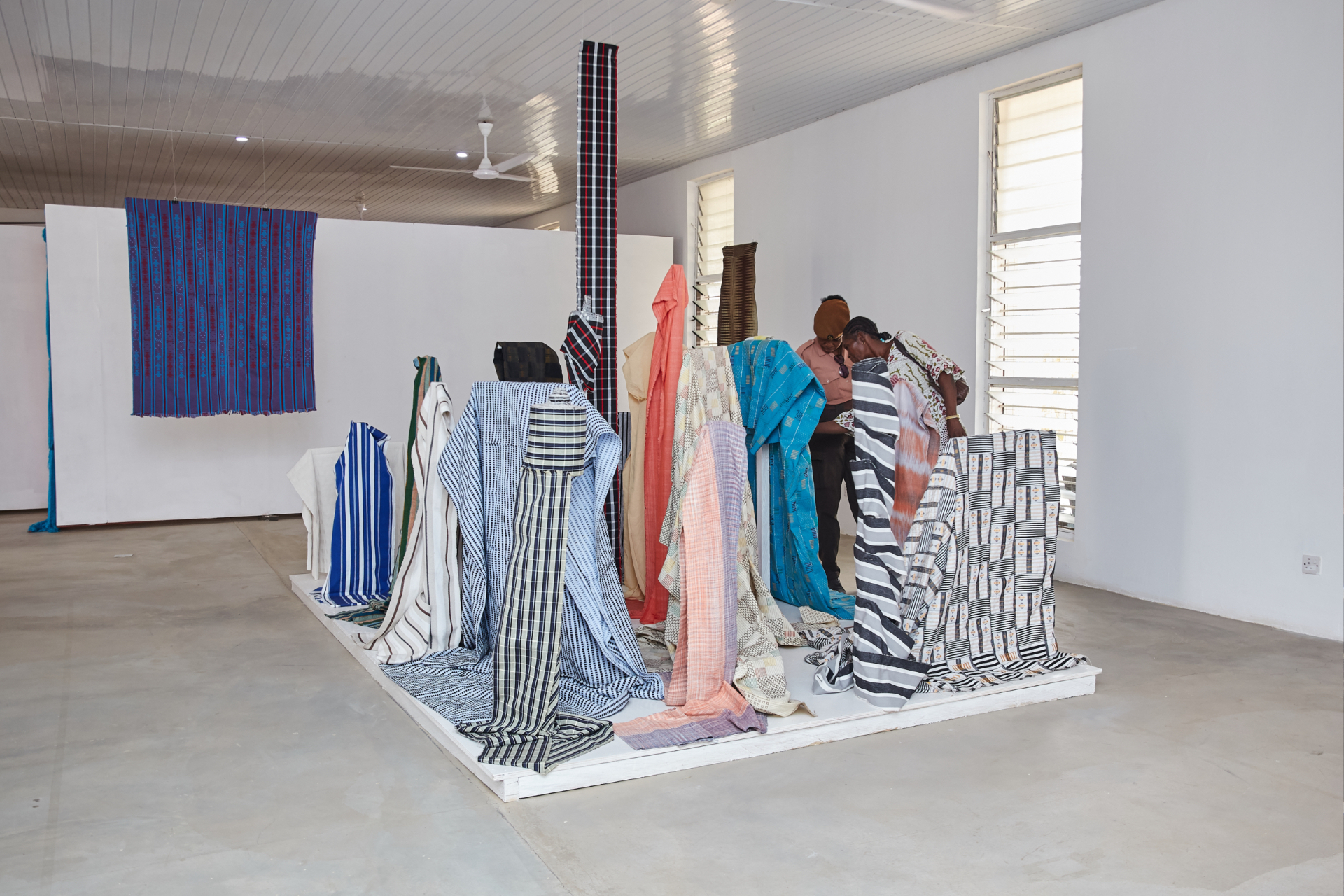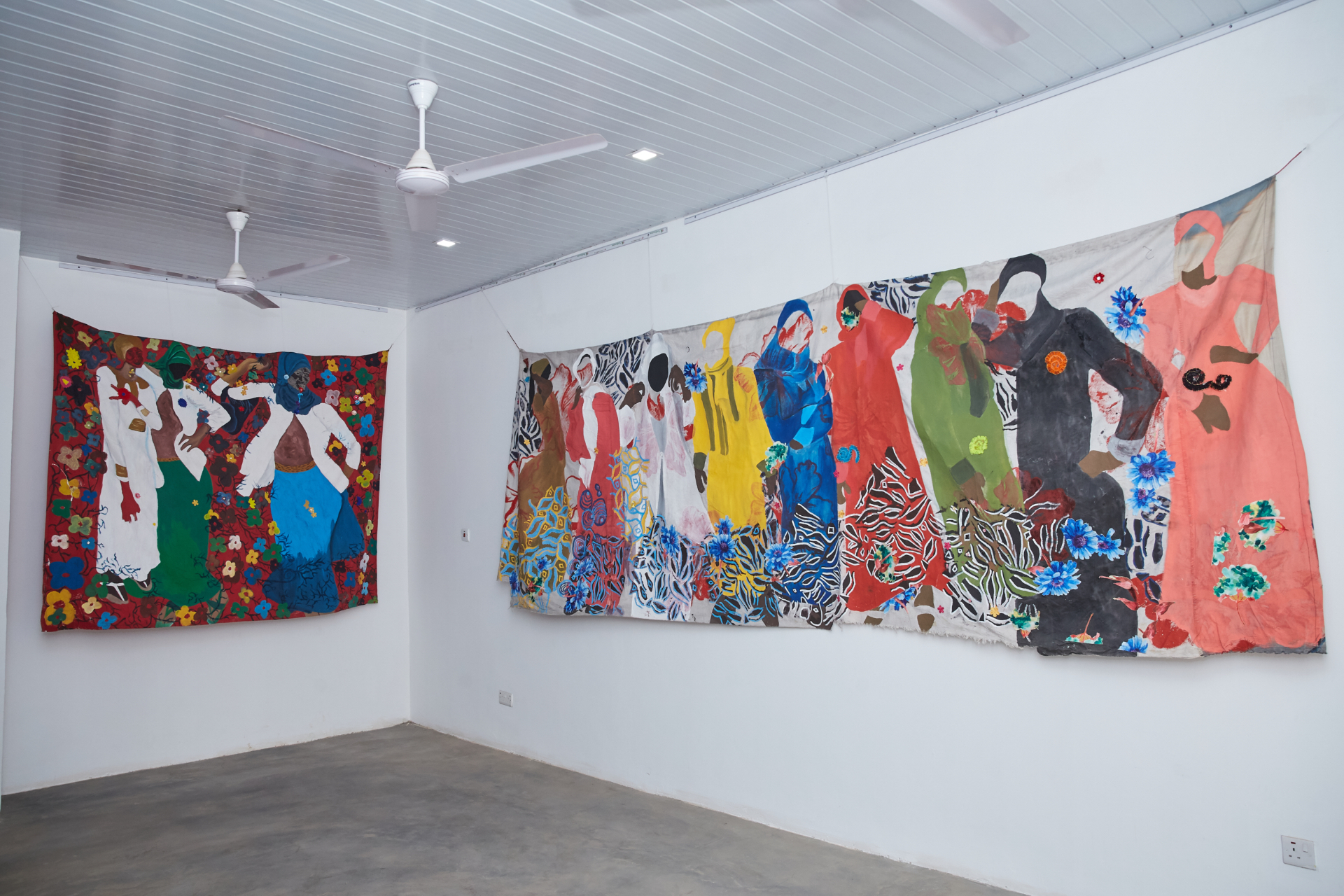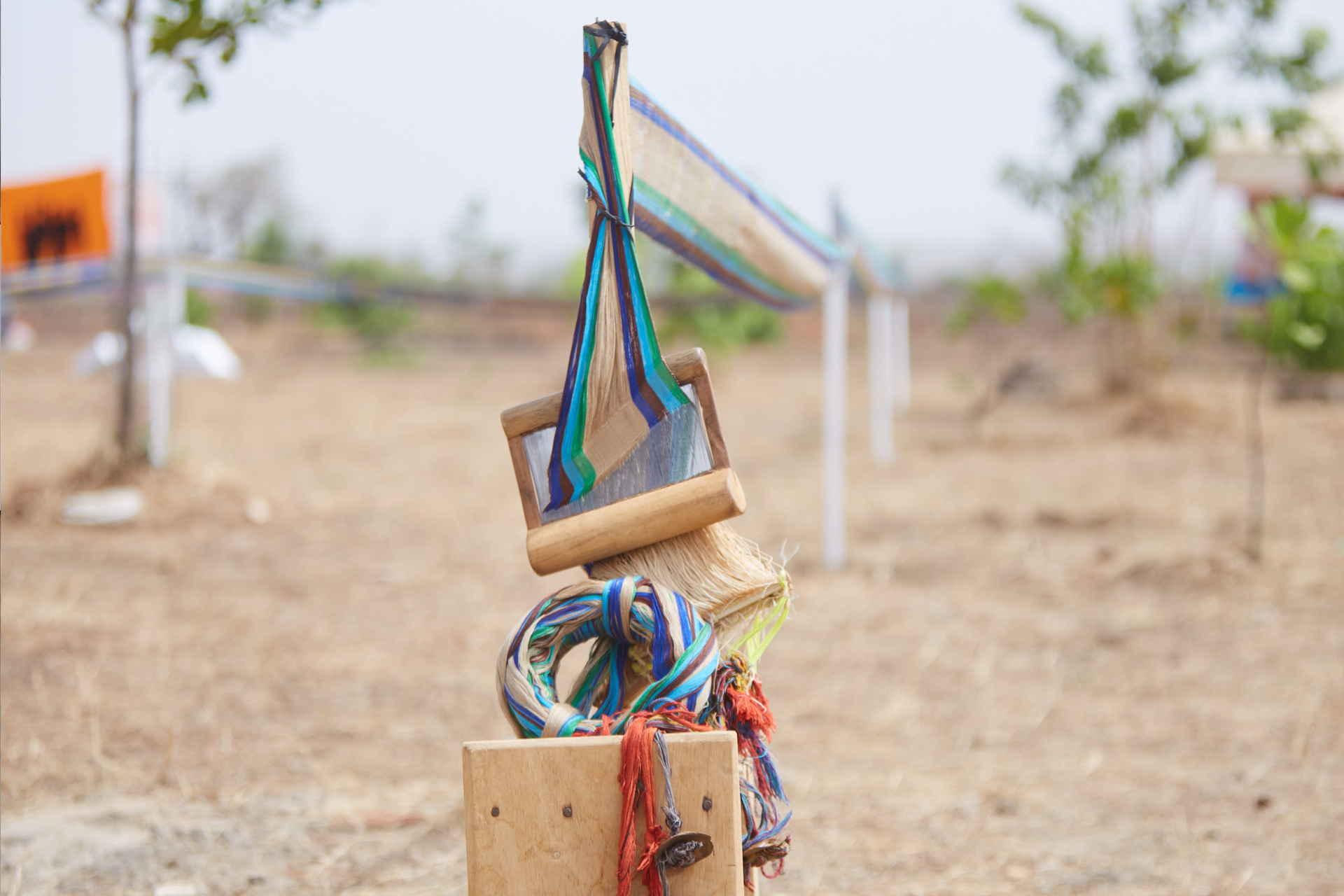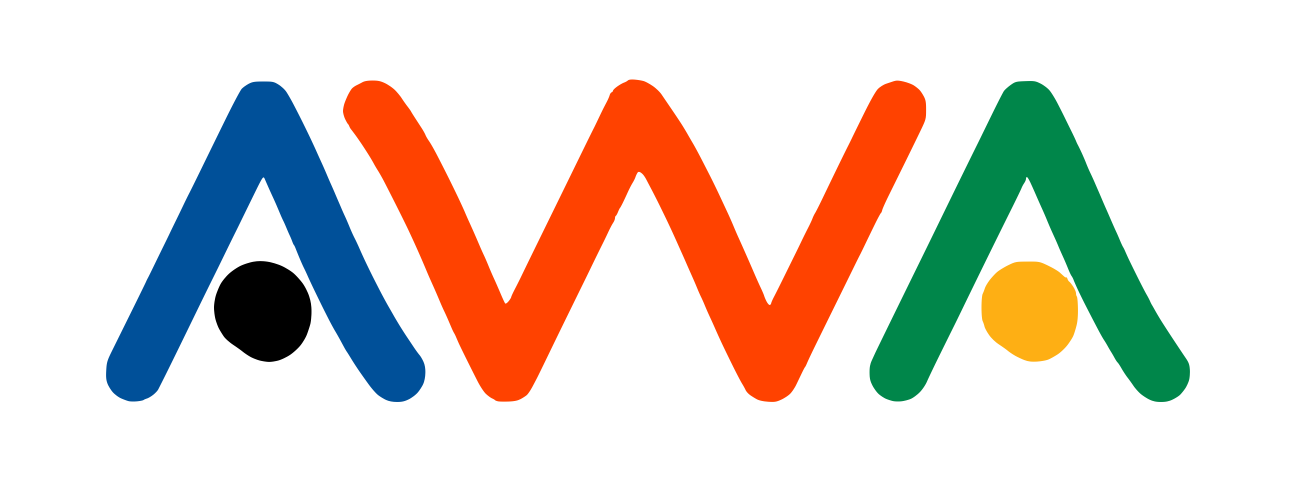Wa Center For Clay and Textiles
Wa, Ghana
The 10th anniversary of Nubuke Foundation coincided with the launching of its newly constructed centre for Textiles and Clay situated in Loho, just on the outskirts of Wa, in the Upper West Region of Ghana.
The ambitious goal of setting up this centre comes from the dream of two of its founding members – Odile Tevie and Kofi Setordji to extend Nubuke Foundation's vision to promote, support and stimulate artisanal practice in clay pottery and textile weaving in one of the beautiful regions in Ghana.
Visit the Nubuke Wa website here.



Permanent Exhibition
Presently, the Permanent Exhibition at the Nubuke Centre for Clay and Textiles features works from Cecilia Lamptey Botchway (YGA 2021) and creations that emerged from the British Council Digital Collaboration (BCDC).
The exhibition showcases various textile styles and patterns created by hand-picked master weavers in the towns of Nadowli, Nandom, and Wa. It also includes additional pieces by Michael Jackson Bleboo, and Edward Lamptey. Also featured are chairs woven by students from the school for the blind.

Library
The centre currently has a makeshift library which we hope to expand to serve the needs of the community. The collection includes children’s books, art publications as well as fictional and non-fictional work.
At this time, donations in kind or other are welcome to help us expand our collection and build a community literary space.
Games
A diverse range of games are available at the centre, such as Oware, Ludu, Cards, Draft, Dame and Skipping Rope.
Woori
Festival
Loho, Wa
Overview
2022 Artists
Following the tradition of festivals in Ghana as sites for commemoration, celebration, and community strengthening and development, Nubuke Foundation conceptualised the WOORI festival.
It is an opportunity to showcase intergenerational indigenous knowledge and interventions within the fields of weaving and pottery and to invite conversations, contributions, and interactions deliberately.
Doing this will lead to increased understanding and transformation of textile weaving and clay moulding tradition in the Upper West region of Ghana.
It is an opportunity to showcase intergenerational indigenous knowledge and interventions within the fields of weaving and pottery and to invite conversations, contributions, and interactions deliberately.
Doing this will lead to increased understanding and transformation of textile weaving and clay moulding tradition in the Upper West region of Ghana.
Tei Huagie
Ransford Anane
Billie Mcternan
Alice Raymond
Edward Lamptey
Edinam Boni Mississo
Halimatu Iddrisu
Seyram Agleze
Gideon Hanyame
The Meaning
2021 Artists
‘Woori’ which means to weave, is a 3-day fest brimming with opportunities for Artisans, artists, technicians and engineers, community knowledge bearers, writers, researchers, musicians, designers, etc to be part of exchanges, talks, master weavers’ demonstrations, trade enquiries and to engage with a wider community of stakeholders for their benefit. It is held annually at the Nubuke Foundation Centre for Clay and Textiles, WA.
Visit WOORI
Visit WOORI
Bleboo Michael Jackson
Na Chainkua Reindorf
Esther Ofosu
Edward Lamptey
Winifred Amoah
Peter Amoako
Residency
The Nubuke Foundation centre for Clay and Textiles serves as a focal point for the community and has become a nurturing and promotion space for textile-based practising artists.
Under ACP-EU CULTURE PROGRAM Support to cultural and creative sectors in West Africa (2021-2023), Nubuke Foundation is offering artist in residency opportunities for up to 4 individuals.
The self-directed residency programme offers artists, writers, designers, curators, scholars, and other creative individuals the time, space and inspiration to retreat, reflect, explore and experiment with their own practice.
This will take place at the Nubuke Foundation’s Centre for Textile and Clay in our serene 10-acre site in Loho, on the outskirts of Wa in the Upper West region.
Calls will be put out in the coming months via Nubuke Foundation’s Social media and website.
AWA
The AWA (Art West Africa) consortium, comprising the Koré Centre in Ségou and Institut Francaise, is the managing body for the implementation of the "ACP-EU Culture Programme: support for the Culture and Creation in West Africa- AWA." The consortium was selected by the EU and The Organisation of African, Caribbean, and Pacific States to distribute funding to the creative and cultural industries of West Africa.
Nubuke Foundation's Centre for Clay and Textiles in Wa is a beneficiary of this creative and cultural support.
British Council Digital Collaboration Fund
The Nubuke Foundation in Ghana, with Assemble in the UK, and the Textile Department at the University of Applied Arts Vienna, Austria, partnered on a digital project aimed at creating a multicultural learning community in close collaboration with artists and crafts(wo)men to stimulate creative exchanges of artisanal and contemporary art practices. In addition, the project focused on collating, disseminating, and further developing indigenous knowledge and skill to foster its preservation and promising passage into the future.
With extensive documentation of what is already taking place in Wa ongoing, the next step is to build online and digital tools to exchange design ideas between makers in Ghana, the UK, and beyond, and long term we imagine residency programmes and new globally marketable products.
We believe in preserving existing knowledge and sustaining local communities economically. The archive resulting from this will be an open, de-colonial, non-judgemental, flexible place of exchange.
Website
Google Arts & Culture
Nubuke Foundation first partnered with Google Arts & Culture in 2015, collaborating on the 89plus Residency Program at Google Arts & Culture Lab. Twenty one artists participated in a workshop at the foundation and explored the synergies of technology and art.
In order to preserve Ghanaian culture and share it with the world, Nubuke Foundation has once again collaborated with Google Arts & Culture, presenting global audiences the opportunity to virtually experience contemporary art from Ghana.
As part of this collaboration and as the first Ghanaian partner to come onboard on Google Arts & Culture, the Foundation is thrilled to share over 270 artworks and 9 online exhibits shining light on Ghanaian contemporary art and artists.
Our goal is to continue to fuel the creative communities. Enjoy exploring our collection on Google Arts & Culture.
Community
Weaving Collectives & Schools
The 10th anniversary of Nubuke Foundation coincided with the launching of its newly constructed centre for Textiles and Clay situated in Loho, just on the outskirts of Wa, in the Upper West Region of Ghana.
The ambitious goal of setting up this centre comes from the dream of two of its founding members – Odile Tevie and Kofi Setordji to extend Nubuke Foundation's vision to promote, support and stimulate artisanal practice in clay pottery and textile weaving in one of the beautiful regions in Ghana.
Weaving Collectives & Associations
Nambeg & Nadowli
Two Collectives of weavers and clay potters from Nadowli and Nambeg worked with Kofi Setordji in 'unpacking' their knowledge of the traditional artistic practice. Through several iterations of learning and unlearning have evolved many delightful creations and products.
What these artisans have learned about the design process and technical tools have furnished them with skills to produce works that bear a marked increase in quality and aesthetics.
School of The Blind And Deaf
Wa, Ghana
Wa Methodist School for the blind and The Wa School for the Deaf (Wadeaf) have received support from the Nubuke Foundation since 2011.
In addition to donations of materials- yarns and dyes, workshops so far have been covered with the Deaf students are Introduction to new design ideas; Colour- Yarn dyeing; Technical- Understanding of equipment and tools, and Entrepreneurial skills.
The students in the Blind School produce furniture- weaving intricate nylon threads around metal frames to make modern designs. We have introduced them to new materials and table looms- providing new skills and ideas on sustainability.
Students from the school for the deaf have also been introduced to new household products that can be made from the materials already at their disposal such as placemats, small baskets, etc.










